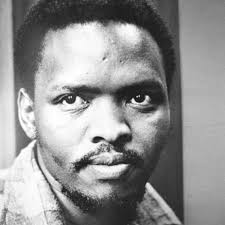Steve Biko
(activist) | |
|---|---|
 | |
| Born | Stephen Bantu Biko 18 December 1946 Ginsberg Township, South Africa |
| Died | 12 September 1977 (Age 30) Pretoria, South Africa |
| Children | Hlumelo Biko |
| Spouse | Ntsiki Mashalaba |
| Interests | • apartheid • human rights |
Anti-apartheid activist who after his death in police custody became an icon for the movement. | |
Bantu Stephen Biko was a South African anti-apartheid activist. Ideologically an African nationalist and African socialist, he was at the forefront of a grassroots anti-apartheid campaign known as the Black Consciousness Movement during the late 1960s and 1970s.
Life
Biko was born in Ginsberg Township in the Eastern Cape province. His father was an office clerk and his mother a housekeeper. Steve was four years old when his father passed away. He excelled in school, but once he was expelled due to his early political interest. From 1966 he was educated at the 'Medical School' in Durban.
While studying at Fort Hare University, he became politically active. He co-founded the South African Students' Organization (SASO) in 1968 and, among other things, organized speeches for the black communities, in order to create greater self-awareness among them. SASO became a huge success and Biko soon became one of the country 's most prominent activists against the apartheid regime. In 1972 he was one of the founders of an umbrella organization, the Black Peoples Convention (BPC). When he was elected leader of the BPC, the apartheid regime intervened. Biko was deregistered as a student in Durban and exiled to his hometown. They tried to silence him. However, Biko continued to work for the BPC and helped set up a fund for political prisoners and their families.
Arrests and death
Between August 1975 and September 1977, Biko was arrested four times by the apartheid regime and interrogated at length. On August 21, 1977, he was imprisoned in Port Elizabeth. Here he was always taken to the police headquarters for questioning. On September 7, doctors diagnosed injuries to his head. They ignored neurological complications. Five days later, Biko lost consciousness. The doctor present advised hospitalization, after which Biko was transported naked in the back of a Land Rover to Pretoria The 1200 km drive took 12 hours. He died a few hours after arriving at Pretoria Central Prison, aged 30 and lying alone on the floor of his cell. The inquest found that he had died of severe brain damage and internal bruises. Since March 1976, he was the nineteenth prisoner to have died under suspicious circumstances. About 15,000 people attended his funeral, including diplomats from 12 western countries.
Memory
Biko's death sparked outrage and alarm in black South Africa as well as in many western countries. Justice Secretary Jimmy Kruger said Biko had died following a hunger strike and that his death "left him cold". Later followed - under the pressure of testimony from Donald Woods and from Allister Sparks, who quoted the pathologist anatomist in The Rand Daily Mail - a new explanation: Biko had indeed died of brain damage, but it remained unclear who was responsible. The three doctors involved were acquitted. The news about Biko's brutal death caused worldwide outcry. Steve Biko became a martyr and symbol of the black resistance to the apartheid regime. Movies followed, including 'Cry Freedom' and songs, such as 'Biko'.
After the political change in 1990, a Truth and Reconciliation Commission was established in South Africa. Twenty years later, five ex - cops confessed to being responsible for Biko's fatal injuries.[1]
Related Document
| Title | Type | Publication date | Author(s) | Description |
|---|---|---|---|---|
| Document:Afterword to "Who Really Killed Chris Hani?" | Book | 29 February 2024 | Christopher Nicholson | Courts have decided that freedom of expression trumps all other rights as without it nobody, including the courts, would ever hear of breaches of other rights. So those who have attempted to suppress this book have prevented the world from discovering and prosecuting the criminals, who perpetrated the foul murders. In law we would describe them as accessories after the fact of these killings. |
References
- ↑ Hill, Shannen L. (2015). Biko's Ghost: The Iconography of Black Consciousness. Minneapolis: University of Minnesota Press. page 215
Wikipedia is not affiliated with Wikispooks. Original page source here